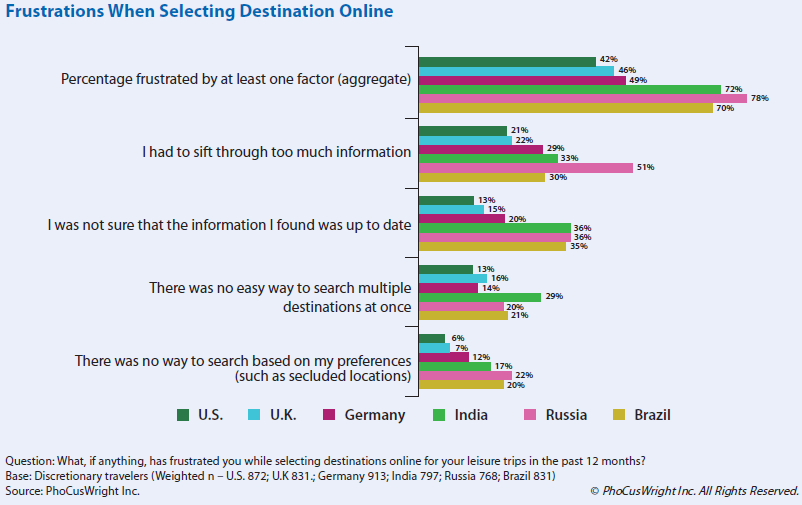The Future of Online Travel Inspiration, Planning & Booking Process
A recently released study by Amadeus: Empowering inspiration: the future of travel search, identifies trend-setting consumers' behavior and motivations when shopping for travel online and identifies their experience during the destination selection, shopping and booking processes. The study also details the key trends and predictions for how consumers want to be able to search for travel online in the future.
The study surveyed 4,638 travelers in the U.S., U.K., Germany, India, Russia and Brazil who represent ‘the discretionary travelers' - the early adopters whose current behaviors and preferences are leading indicators of behavior in the future.
What we keep in relation to destinations is the need to inspire and convert consumers while minimizing frustration levels due to information overload and lack of trust in available deals. Using advanced destination selection and content customisation tools to attract and inspire consumers earlier in the travel planning process is key to gaining competitive edge in the months and years ahead.
Amongst the key findings of the survey we find:
New ways in which travelers would like to search for travel
In the developed markets, nearly 50% of travelers had a particular place in mind, whereas in the emerging markets, it was only about a third of travelers. Catering to these travelers is advantageous, as attracting shoppers earlier in the purchase funnel broadens their audience and reduces their reliance on search and referral traffic. Furthermore, more than four in 10 travelers across the markets are flexible about travel dates, thus tools that help determine where and which travel dates have the lowest price have widespread appeal. It is time to think outside of the traditional city pair/travel date box.
How travelers want to use mobile devices and social networks when planning and sharing travel experiences
Three in 10 travelers in Europe currently have no interest in using their mobile phones for travel-related activities, but U.S. consumers show levels of interest comparable to emerging markets for mobile features such as alerts, check-in, etc. Mobile device usage for travel is more than twice as common in emerging markets, most notably in India, where nearly 24% of travelers research destinations online on their phones.
How new technologies may change travel planning in the future:
The truly private private sale: Marketplaces around the world have been flooded with promotions, deals, and now flash sale brands that tout discounts with no context of whether an individual would be interested in the product. As consumer segmentation and behavioral targeting to consumers becomes more sophisticated, sellers will be able to microtarget promotions to specific consumers, offering products that are actually relevant for the buyer.
Cumulative intelligence: With hundreds of options, online shoppers are overloaded. Eventually, programs will learn from an individual's behavior over time by observing and aggregating common patterns. Microsegmentation will help companies analyze behavior and deliver increasingly intelligent results.
Smart systems and virtual private assistant: Devices will become smart and interconnected, and will store and make sense of information consumers look at. The program will recognize and process inputs from the sites consumers visit and what they do on them, and will act as an assistant on the consumer's behalf.
You will find the entire survey here.
Source: www.amadeus.com


COMMENTS